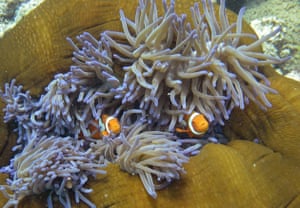This election is Australia's last chance to save the reef, which requires $1bn a year for 10 years to reduce water pollution to give it a chance to survive climate change, report warns
 |
| The Great Barrier Reef is experiencing its worst ever bleaching event. Photograph: William West/AFP/Getty Images |
The government needs to commit to $1bn a year for 10 years to reduce water pollution, which would give the reef a chance to survive the impacts of climate change, according to the paper published in the journal Estuarine, Coastal and Shelf Science.
"This is the last chance," said the lead author, Jon Brodie from James Cook University. "The current spending is totally inadequate ... You either do it properly or you give up on the reef. It's that bad."
Climate change is dramatically impacting the reef, with warm water causing 93% of coral reefs to bleach this year. It is the worst bleaching event ever seen in the Great Barrier Reef. Mass bleaching events were never seen before 1998.
The reef's ability to recover from bleaching is hampered by water pollution, caused largely by nearby land-clearing, as well as fertiliser and pesticide run-off from farming. Fishing also damages the reef's resilience by disrupting the ecosystems that support healthy coral.
Brodie and his colleague Richard Pearson analysed all the current management plans, evaluated their impacts and developed an estimate of what would be needed to give the reef a fighting chance against already locked-in climate change. The required measures would cost $10bn over 10 years. Brodie said that would get water quality to a point where the reef was in the best shape possible to fight the impact of climate change.
"It's a lot of money but the alternative is just to give up on the reef," Brodie said. "We know how to do it. In fact right now we're spending a little bit of money doing some of it and we have made a little bit of progress with that little bit of money but we just need a lot more."
Several water quality improvement plans have been created over the past couple of years. They involve input from agricultural scientists, reef ecologists, economists and social scientists. Using those, Brodie was able to develop a plan.
The analysis recommended management of the reef be extended from the world heritage area to include the "greater Great Barrier Reef". That would extend from the Torres Strait in the north to Hervey Bay in the south and include the catchment areas that are directly responsible for the water pollution.
It also found a focus should be diverted from the struggling reefs to the ecosystems that are still in relatively good condition, including those in the Torres Strait, northern Cape York and Hervey Bay.
Stronger regulation was also needed, with powers available under the federal Environment Protection and Biodiversity Conservation Act and the Great Barrier Reef Marine Park Act being used to stop activities on land that are polluting the water.
Some of the required measures could be controversial, including buybacks of some sugarcane farms that are too polluting. But Brodie said many of those farms were not particularly profitable and many farmers would be happy to sell the land.
The $10bn needed by 2025 amounted to $1bn a year. But since the reef was estimated to generate up to $20bn a year for the Australian economy, that amounted to just 5% of its economic value for a limited time.
Brodie said this federal election was the last chance for the reef. If this plan or one like it wasn't committed to, he said it could be time to give up on the reef. "It takes time for change to happen and we need to start fast," he said.
Imogen Zethoven from the Australian Marine Conservation Society said: "Things are worse than we thought for the reef's future; we are close to the brink of what this fragile ecosystem can tolerate without a credible plan for restoring it to good health.
"This federal election is an historic opportunity for political leaders to take heed and act decisively to stop its destruction," she said.
Links
- Great Barrier Reef bleaching made 175 times likelier by human-caused climate change, say scientists
- Saving Great Barrier Reef from climate change should be central election issue, says Tim Flannery
- Great Barrier Reef: tourism operators urge Australian government to tackle climate change
- Scientists resort to advertising to get Great Barrier Reef crisis in Queensland paper
- Mass coral bleaching now affecting half of Australia's Great Barrier Reef
- Great Barrier Reef government panel to include climate change experts
- Planting coral could save Great Barrier Reef from climate change, say scientists
- Great Barrier Reef: warmer waters helping coral-eating starfish thrive

No comments :
Post a Comment